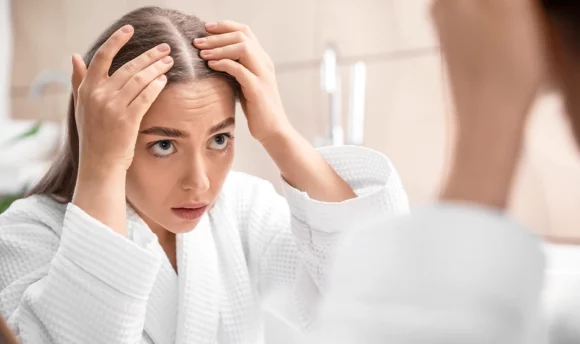Do Hats Really Cause Hair Loss? Dispelling the Myth
Finding strands of hair in your hat whenever you take it off can make you wonder if wearing a hat causes hair loss. We investigated the link between hats and hair loss to find out if wearing one makes your hair fall out.

The idea that wearing hats can cause hair loss is a long-held popular belief. From cautionary tales passed down from older generations to articles in popular magazines, many people are wondering whether hats cause hair loss.
However, as we learn more about the science of hair thinning, it’s becoming clear that this theory may not be true. Many experts suggest that hats have little to no impact on hair loss.
In this article, we’ll explore the myths and misconceptions surrounding hats and hair loss and delve into the scientific research that sheds light on this topic. If you’ve been wondering whether your trusty cap is causing your hair thinning, read on to find out what the evidence says.
Do Hats Cause Hair Loss?
No, wearing a hat does not result in hair loss. There is no conclusive scientific evidence that suggests a direct relationship between hat-wearing and losing your hair.
Only if you wear a very tight hat on a regular basis is it possible that your hat makes you lose hair. This is referred to as traction alopecia which is the result of your hat constantly pulling on your hair.
Similar to wearing a very tight ponytail or heavy hair extensions, an extremely tight hat exerts stress on your hair follicles and reduces the blood flow in your scalp causing you to lose hair.
However, hair loss is a complex issue with many underlying causes. Your risk of hair fall is greater if you have a family history of female or male pattern baldness, for example, making you more genetically sensitive to hair loss.
If you love your hats, there’s no need to worry that they are causing your hair to fall out. However, if you are experiencing hair loss, speaking with a healthcare professional to determine the underlying cause and explore treatment options is recommended.
Can Hats Damage Your Hair?
It is unlikely that hat-wearing causes hair damage. However, your hair may be negatively affected if your hat is too tight, made from rough or abrasive materials, or worn for extended periods.
Rough or abrasive hats can cause friction, causing hair strands to split and break. However, if you choose hats that fit correctly and are made from soft and gentle materials, wearing one is unlikely to damage your hair.
Additionally, taking good care of your hair, such as washing it regularly, drying it with a microfiber towel, and avoiding excessive heat styling with hair dryers and curling irons, can help maintain healthy and strong hair, even if you consistently wear hats.
After Taking My Hat Off, My Hair Falls Out: What Are the Other Reasons?
Although consistently wearing a hat, particularly if it is extremely tight-fitting, may place strain on the hair follicles, resulting in traction alopecia, a well-fitting hat is unlikely to cause hair loss, including male pattern baldness.
If you find hair strands in your hat when you remove it, the hair fall may be caused by other endogenous and exogenous factors. Your receding hairline or bald spot may be due to an underlying medical condition, certain medications, or hormonal changes, as well as your diet and haircare routine.
Genetic hair loss must also be considered, and consulting with a healthcare provider for professional medical advice can help you identify the root cause of the problem. Below are 5 reasons for hair fall.
#1 Androgenic alopecia
Androgenic alopecia is a form of genetic hair loss that affects both men and women. It is characterized by gradual hair loss in a specific pattern and is frequently referred to as male-pattern baldness or female-pattern baldness.
Androgenetic alopecia is caused by the effects of androgen hormones, a group of sex hormones including testosterone, on the hair follicles. High levels of certain androgens can lead to smaller hair follicles and a shorter hair growth cycle.
Male pattern hair loss typically starts with a receding hairline at the temples, followed by thinning at the crown of the head. Women with androgenic alopecia typically experience hair thinning on the top of the head while maintaining a frontal hairline.
#2 Medical conditions
There are many medical conditions that can cause hair loss, including the following:
- Alopecia areata: Alopecia areata is an autoimmune disorder in which the immune system attacks hair follicles, causing hair loss in patches.
- Thyroid disorders: An overactive or underactive thyroid can lead to hair loss.
- Nutritional deficiencies: Each hair follicle relies on nutrition to produce healthy hair, and deficiencies in nutrients such as iron, vitamin D, and biotin can cause hair loss.
- Scalp infections: Fungal or bacterial infections of the scalp, such as tinea capitis, can cause hair loss.
- Trichotillomania: Trichotillomania is a compulsive disorder in which a person pulls out their hair, causing hair loss.
It’s important to consult with a healthcare provider for professional medical advice if you are experiencing hair loss to determine the underlying cause and appropriate treatment.
#3 Medications
An uncommon side effect of several medications is temporary hair loss, also known as drug-induced alopecia. Some of the medications that can cause hair loss include:
- Chemotherapy drugs
- Blood thinners such as heparin and warfarin.
- Antidepressants such as fluoxetine and sertraline.
- Medications used to treat epilepsy and seizures, such as valproic acid and carbamazepine.
- Beta-blockers used to treat high blood pressure and heart disease.
- Retinoids used to treat skin conditions such as acne and psoriasis.
It’s important to note that not everyone who takes these medications will experience hair loss, and in many cases, the hair loss is temporary and will grow back once the medication is stopped.
However, if you are experiencing hair loss while taking medication, it’s important to speak with your healthcare provider to determine the cause and appropriate treatment.
#4 Stress
Firstly, stress causes a physiological response in the body, resulting in the release of cortisol. Chronic stress can cause elevated cortisol levels, which may disrupt the normal hair growth cycle, leading to hair loss.
Secondly, stress can lead to a condition called telogen effluvium, temporary hair loss that occurs when many hair follicles are pushed into the resting phase of the hair growth cycle.
Telogen effluvium can occur due to a physical or emotional stressor, such as surgery, illness, or a traumatic event.
#5 Hormonal changes
Hormonal changes can affect hair growth and cause hair loss in a few different ways. For example, hormonal changes that occur during pregnancy and childbirth can lead to the loss of hair.
During pregnancy, the body produces higher levels of estrogen, which can prolong the growth phase of the hair cycle and reduce the rate of hair shedding. However, after childbirth, estrogen levels drop, and many women experience increased shedding and hair loss.
In addition, hormonal changes associated with menopause can also lead to hair loss in women. As estrogen levels decline, hair may become thinner, and hair fall may occur.
FAQs
No, wearing a hat does not impact the rate of hair growth. However, to ensure good blood flow to the scalp, choose a hat that is not too tight.
In general, wearing a hat does not cause damaged hair, but if your hat is too tight or made out of rough fabric, the friction it causes might have negative consequences.
Yes, hats can cause traction alopecia if they are too tight and constantly pull on your hair.
Hat-wearing doesn’t necessarily speed up the hair-loss process. However, it can make hair fall more noticeable if hair strands are left in your hat.
A Word From a Trichologist
While wearing hats can potentially contribute to hair loss, it is usually not the primary cause. It’s important to understand that hair loss is usually caused by genetic factors, hormonal imbalances, or certain medical conditions.
However, wearing a hat that is too tight or made from materials that don’t allow for proper ventilation can cause the scalp to become sweaty and irritated. This can lead to inflammation and damage to the hair follicles, which can result in hair loss over time.
Additionally, wearing a hat for extended periods of time can also lead to hair breakage. If you frequently wear a hat, be sure to choose one that doesn’t constantly rub against your hair, causing friction and damage.
Wearing hats in moderation and taking proper care of your hair can help prevent these issues. Choose hats made from breathable materials such as cotton or wool to prevent scalp irritation.
As with most things related to hair health, moderation and proper care are key. If you are experiencing hair loss or other issues related to your hair and scalp, it’s always best to consult with a trichologist or other medical professional for guidance on hair restoration.
Conclusion
Although many people believe that wearing a hat may cause hair loss, the risk is small. Even if you notice that a few strands of hair are left behind in your hat when you take it off, the cause is more likely to be an underlying genetic or medical condition.
To ensure that your hat is not the cause of your hair loss, wear one that is not too snug and is made from soft, natural fabrics that don’t rub against your hair and cause damage.
If you are concerned about the strands of hair left behind in your hat when you remove it, or if you are losing more hair than usual, book an appointment with your healthcare professional to identify the underlying cause of your hair loss.

















































 Select your language:
Select your language: 










